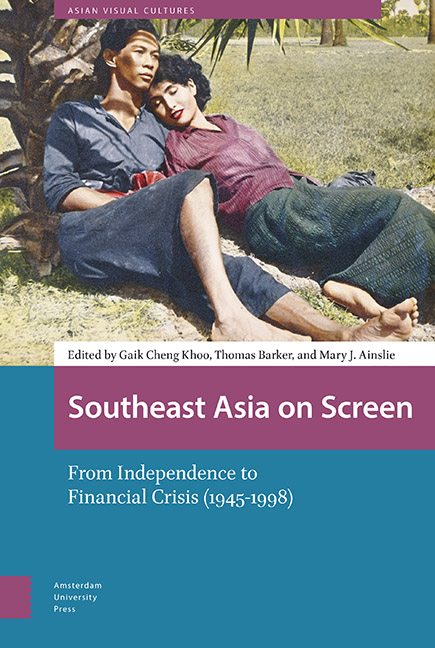Book contents
- Frontmatter
- Contents
- List of Illustrations
- Introduction: Southeast Asia on Screen: From Independence to Financial Crisis (1945–1998)
- Section 1 Independence and Post-World War II Filmmaking: Nation-building, Modernity and Golden Eras
- Section 2 Key Directors
- Section 3 Popular Pleasures
- About the Authors
- Index
Introduction: Key Directors
Published online by Cambridge University Press: 20 November 2020
- Frontmatter
- Contents
- List of Illustrations
- Introduction: Southeast Asia on Screen: From Independence to Financial Crisis (1945–1998)
- Section 1 Independence and Post-World War II Filmmaking: Nation-building, Modernity and Golden Eras
- Section 2 Key Directors
- Section 3 Popular Pleasures
- About the Authors
- Index
Summary
In the current millennium, Southeast Asian film auteurs have been gaining international recognition at A-list European and Asian film festivals, while their films receive critical attention overseas. However, Southeast Asian cinema history is not short of auteurs, loosely defined here as filmmakers with a body of work that carries a certain personal signature. This section pays tribute to veteran filmmakers and directors from the region who are lesser known in the English-speaking world. Although acknowledged as masters or auteurs in their home countries, such individuals have actually had very few studies dedicated to them and their work. Malay film director Hussain Haniff (often hidden by the towering figure of P. Ramlee and thus, compared here with Ramlee), Mike de Leon (who, as Lino Brocka and Ishmael Bernal's junior, also tends to be overshadowed by these giants), Indonesian directors Teguh Karya and Sjuman Djaya (often compared to Usmar Ismail), and the oft-romanticized Thai master Ratana Pestonji (who stands out as the sole visionary Thai auteur of that period), all fit this mould.
Notably, the careers of these influential figures largely spanned the Cold War era, when American imperial and political influence exercised power in the region in the form of US support for authoritarian regimes like Marcos's in the Philippines or Suharto's New Order. These filmmakers are often described as directors with integrity who, while immersed in the national film industry making mainstream films, also managed to make some pointed critiques at the societies they lived and worked in, whether it is the increasing class disparity and issues facing the poor or young widows (Ainslie; Hanan and Soehadi), ethnic minorities’ plight in Jakarta (Hanan and Soehadi), corrupt feudalism (Driskell), or state violence and human rights violations (Campos). Such figures are noticeably all male, and the women directors working during this era that the section could not cover should also be mentioned. These include Ida Farida in Indonesia (active from 1979-1991), who in turn was encouraged by the late female director Sofia W.D. (b. 1924-1986), Rosa Mia in the late 1950s and 1960s of the Philippines with Laurice Guillen and Marilou Diaz-Abaya in the 1970s-1980s, while Nguyen Viet Linh made six features in Vietnam between 1986 and 2002.
- Type
- Chapter
- Information
- Southeast Asia on ScreenFrom Independence to Financial Crisis (1945–1998), pp. 131 - 132Publisher: Amsterdam University PressPrint publication year: 2020



